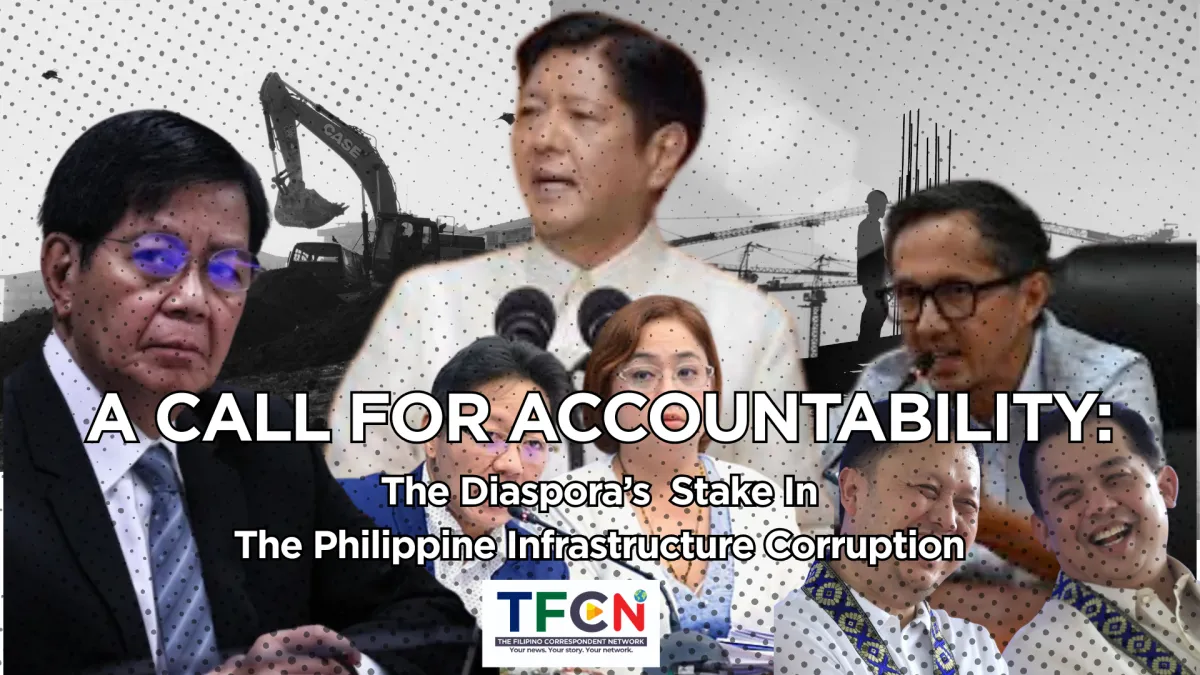
A Call For Accountability: The Diaspora’s Stake In Philippine Infrastructure Corruption
MANILA—The recent revelations of massive corruption surrounding crucial Philippine infrastructure projects, particularly those meant for flood control and disaster resilience, are not merely a domestic fiscal issue—they represent an existential threat to the families and future of every Overseas Filipino (OF). The Filipino diaspora, a financial pillar of the nation, is compelled to move beyond concern and into informed action.
Reports in the last quarter exposed a deeply entrenched system involving “ghost projects,” padded contracts, and substandard materials, primarily in the flood control sector. The plunder of these essential funds is not just a financial crime; it is an act of betrayal that directly endangers lives.
Accountability and Economic Impact
As of early November 2025, the government’s response and the resulting economic impact are dominating headlines:
Formal Charges Proceeding & Jail Time: The Department of Justice (DOJ) has issued subpoenas for an initial investigation into five alleged "ghost" flood control projects in Bulacan. The commitment to swift justice was underscored by the government's infrastructure chief.
DPWH Secretary Vince Dizon recently stated: “Sa tingin ko, sa kulungan na sila magpa-Pasko niyan.” (“I think they will all be spending their Christmas in jail.”)
Wider Cost-Cutting Order: President Marcos Jr. has ordered all government agencies to adopt the same market-aligned pricing system first imposed on the Department of Public Works and Highways (DPWH). This directive aims to curb corruption by aligning project costs with real market rates, preventing budget inflation.
Dipping Confidence and Economic Growth: The economic fallout is becoming clearer. The country’s top economic managers have signaled caution on the immediate growth outlook.
Secretary Arsenio M. Balisacan of the Department of Economy, Planning and Development (DEPDev), noted: “Of course, these corruption scandals could also impact on sentiments—investment sentiments and consumer sentiments.”
The resulting fiscal prudence may temper immediate figures, as acknowledged by the finance department: Finance Secretary Ralph G. Recto explained: “Posible magkaroon ng slowdown in growth etong 3rd quarter because of all the reforms being initiated by our President na siguraduhin na magastos nang tama ang taxpayers' money in executing the budget as well.”
The scandal acts as a direct drag on the national economy, impacting the very growth remittances are meant to support.
The Direct Cost to the Filipino Diaspora
Despite these efforts, the crisis hits close to home for OFs in three critical ways:
1. Endangering Loved Ones and Property
The primary purpose of funds allocated to dikes, seawalls, and drainage systems is to protect communities from the escalating threat of typhoons and climate change. When these projects are compromised by graft—resulting in failed structures or non-existent works—the families of OFs are left acutely vulnerable to injury, death, displacement, and the total loss of their hard-earned properties.
2. Eroding the Value of Remittances
Overseas Filipino Workers (OFWs) send home billions annually, sustaining the national economy. Corruption in public works acts as a colossal "corruption tax" on these remittances. Instead of reliable public services, funds are diverted to private accounts. This forces families to use the money sent for necessities like food and education toward costly repairs of substandard public roads and other essential services—effectively diminishing the purchasing power and impact of every dollar or dirham remitted.
3. Perpetuating the Brain Drain Cycle
Many Filipinos leave the country precisely because of the lack of opportunities and the systemic corruption that cripples economic mobility. The persistence of high-profile corruption confirms this grim reality, fostering political disillusionment and discouraging skilled professionals from returning home. This continuous brain drain prevents the very institutional and structural reforms needed to establish clean governance and resilient infrastructure.
The Call to Action: How the Diaspora Must Engage
The global reach and financial power of the Filipino diaspora equip it with a unique ability to pressure for change.
I. Demand Non-Negotiable Accountability
Support Whistleblowers and Watchdogs: Direct financial support and volunteer resources toward credible, non-partisan civil society organizations (CSOs) that are actively investigating and monitoring projects.
Insist on Justice: Use social media and community platforms to sustain public pressure for the swift, impartial, and public prosecution of all officials, contractors, and intermediaries implicated in the infrastructure fraud.
II. Leverage Political Influence
Vote with Integrity: Overseas Filipino Voters (OFOVs) must prioritize candidates in upcoming elections based on a clear, verifiable track record of integrity, transparency, and commitment to institutional reform.
Advocate for Transparency Reforms: Lobby the government and international partners for the immediate and full implementation of crucial legislation, including a strong Freedom of Information (FOI) Law and the mandatory, public disclosure of all infrastructure contract details and project expenditures.
III. Engage with Global Standards
Share Expertise: Professionals within the diaspora should actively share global best practices in engineering, public procurement, and anti-corruption governance with Philippine professional organizations and local government units.
Invest Ethically: Encourage fellow OFs and foreign entities to invest only in Philippine businesses and projects that adhere to the highest standards of corporate governance and anti-corruption compliance.
Corruption in public works is not a distant political drama; it is a life-and-death issue for the Filipino people. The diaspora’s collective voice and influence are vital to transforming the country’s infrastructures of corruption into genuine infrastructures of accountability and resilience.
(For your comments and suggestions, e-mail TFCN at [email protected].)

